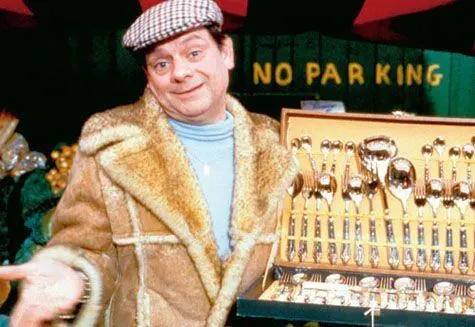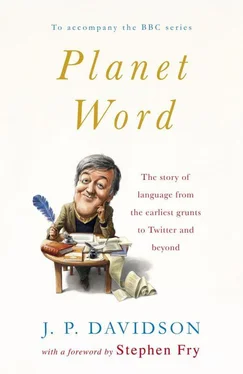The ‘secret tongue’ of the costermongers, the mobile fruit and veg sellers, was back-slang — essentially pronouncing a word backwards. There were tens of thousands of ‘costers’ in Victorian London, with a reputation, according to a book published in 1859 by John Camden Hotton entitled A Dictionary of Slang, Cant and Vulgar Words , of ‘low habits, general improvidence and their use of a peculiar slang language’. They were a tight-knit community with a common enemy — the police — and seemed to have developed back-slang, a private language which the punters and non-locals couldn’t understand. The back-slang was used mostly for words involved in their trade and everyday life — coins, vegetables, fruit and police. So dunop was a pound, yennep a penny, rape a pear, storrac carrots, spinsrap parsnips, slop a policeman. A costermonger told Henry Mayhew, author of the study London Labour and the London Poor (1851): ‘I likes a top o’ reeb.’ Almost all the words have become obsolete, except yob , which is, of course, ‘boy’ backwards.
Back-slang was gradually abandoned by the costers and replaced by rhyming slang. The butchers took it up, and by the twentieth century back-slang was regarded as entirely their secret language.
What is it about butchers that makes them so secretive? Butchers in Paris and Lyon developed their own secret language in the mid nineteenth century as well. It was a much more complicated slang called loucherbem , closer to Pig Latin than back-slang. The first consonant of each word is moved to the end, a suffix such as — em is added and the letter L is added to the start of the new word. Thus boucher (butcher in French) becomes loucherbem .
Secret languages are the stuff of childhood. Generations of schoolboys have thrilled to the mystery of writing notes in invisible ink and speaking in a code which no one outside their inner circle of chums understood. Pig Latin was a language game beloved of schoolchildren. It wasn’t really Latin (just sounded a bit like it) and involved putting the first letter of a word at the end and then adding — ay. ‘Owhay oday ouyay oday?’ (How do you do?’). Pig Greek — or ubbi dubbi — is another one; also aigy paigy, Double Dutch and gibberish.
These secret languages are essentially games, abandoned in adulthood. But there are other ingenious, covert languages which have developed within a group or a community, often to hide illicit practices or allow coded talk about others without them knowing; in some instances, they’ve spread to become part of the general vocabulary. The argot which we are all most familiar with — especially through TV shows like Minder, Only Fools and Horses and EastEnders — is Cockney rhyming slang.

Del Boy carrying on the Cockney tradition
Much more fun than Pig Latin, rhyming slang is a glorious feast of linguistic gymnastics, peculiar to the English language and prevalent in the East End of London in the second half of the nineteenth century. The construction involves replacing a word (let’s say ‘feet’) with a rhyming phrase (‘plates of meat’) and then dropping the rhyming part of the phrase (‘meat’ goes, ‘plates’ stays). In practical terms it means that ‘feet’ become ‘plates’ and unless you’re familiar with the rhyme, the original word is hidden.
Have a go at translating this:
I had a Jane down the frog with a septic, his trouble and their dustbin lid. Would you Adam and Eve it? My old china was wearing a syrup under his titfer, a whistle, a Peckham and a pair of churches.
Translation: I had a wander ( Jane Fonda ) down the road ( frog and toad ) with an American ( septic tank — Yank), his wife ( trouble and strife ) and their kid ( dustbin lid ). Would you believe ( Adam and Eve ) it? My old mate ( china plate ) was wearing a wig ( syrup of fig ) under his hat ( tit for tat ), a suit ( whistle and flute ), a tie ( Peckham Rye ) and a pair of shoes ( church pews ).
No one knows for sure when and where rhyming slang originated, but it was certainly flourishing in early Victorian England. Henry Mayhew noted: ‘The new style of cadgers’ [street sellers’] cant is all done on the rhyming principle.’ John Camden Hotton informs us that rhyming slang originated in the 1840s with ‘the wandering tribes of London’. Hotton is adamant that the rhyming wasn’t invented by costermongers — who took up the rhyming slang later — but by two other types of street traders.
There exists in London a singular tribe of men, known amongst the ‘fraternity of vagabonds’ as Chaunters and Patterers. Both classes are great talkers. The first sing or chaunt through the public thoroughfare ballads — political and humorous — carols, dying speeches, and the various other kinds of gallows and street literature. The second deliver street orations on grease-removing compounds, plating powders, high polishing blacking, and the thousand and more wonderful pennyworths that are retailed to gaping mobs from a London kerb stone.
They are quite a distinct tribe from the costermongers; indeed, amongst tramps, they term themselves the ‘harristocrats of the streets,’ and boast that they live by their intellects. Like the costermongers, however, they have a secret tongue or Cant speech, known only to each other.
This cant … is known in Seven Dials [a notoriously disreputable part of London] as the Rhyming Slang, or the substitution of words and sentences which rhyme with other words intended to be kept secret.
Hotton’s Glossary included rhyming slang still in currency today: apples and pairs — stairs; elephant’s trunk — drunk; pen and ink — stink; mince pies — eyes; macaroni — a pony; sugar and honey — money; other ones, like Duke of York — take a walk; and Top of Rome — home, have disappeared.
It was called Cockney rhyming slang but really it was a Londoners’ slang and especially working-class Londoners. The word Cockney is thought to have derived from cockeney , a fourteenth-century word used to describe both a misshapen egg (hence a cock’s egg) and a spoilt, ‘cockered’ child. By the early seventeenth century, the two meanings of being odd and being spoilt appear to have merged into a contemptuous name used by country folk for a soft, puny townsperson, typically a Londoner. Another derivation for the word was suggested by Frances Grose in his A Classical Dictionary of the Vulgar Tongue :
A citizen of London, being in the country, and hearing a horse neigh, exclaimed, Lord! how that horse laughs! A by-stander telling him that noise was called Neighing, the next morning, when the cock crowed, the citizen to shew he had not forgot what was told him, cried out, Do you hear how the Cock Neighs?
So a Cockney was a Londoner in general, or more specifically, according to John Minsheu in his Ductor in linguas (Guide into Tongues) dictionary in 1617, ‘one born within the sound of Bow bell, that is in the City of London’. The Bow Bells were in the church of St Mary-le-Bow in Cheapside, an area that today is largely non-residential. The bombing of the East End of London during the Second World War meant the migration of huge numbers of traditional Cockneys to the new towns on the outskirts of Greater London. You’re more likely to hear old-style Cockney rhyming slang in Basildon or Harlow in Essex and in parts of Hertfordshire than in Cheapside or Whitechapel. In turn, waves of immigration into London’s East End — most recently Bengali — have provided a melting pot mixture of different languages. East end teenagers today talk about skets not eggs and kippers (slippers) or creps rather than Gloria Gaynors (trainers). And life isn’t so much Robin Hood (good) as Nang! Years before the traditional Cockney-speakers were displaced to the London outskirts, Cockney rhyming slang was spreading itself throughout Britain and beyond. Observers commented on how the language of the first convict settlers to Australia was that of Cockney London, and the exuberance of today’s Australian slang has undoubtedly been influenced by it. In Britain, some of the words and phrases have lodged so firmly in our everyday language that we’d be hard put to recognize them as original rhyming slang.
Читать дальше













